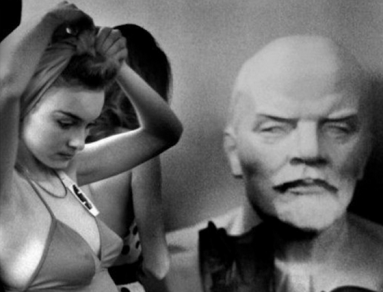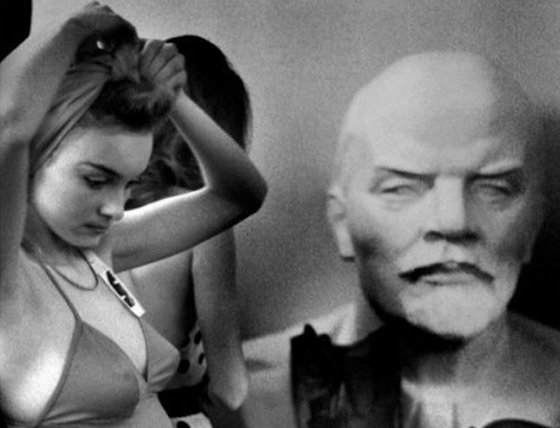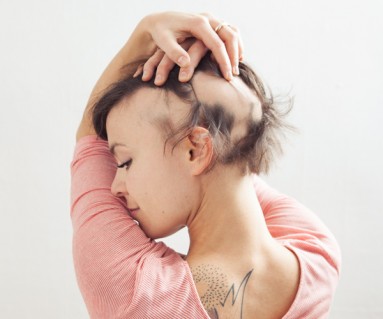Fumble & Bumble: The founder of Bumble & Bumble was arrested for a wee oversight on his 2006 taxes, when he failed to notify the IRS about the $29.6 million he raked in after selling part of his company to Estee Lauder. Oopsie!
Rinse and repeat: In an effort to trim 10% of its non-manufacturing workforce, Proctor & Gamble is slashing its marketing team. Of interest here is the company's strategic shift to develop fewer ads, since the breadth of messages were diluting the brand.
Laws schmaws: Know what's annoying? When a company that supposedly exists to serve women has a crappy record of discriminating against pregnant (or black, or disabled) employees, à la Sisley Cosmetics.
Like, Detroit?: L'Oréal is
buying Urban Decay in an effort to increase its presence on the somewhat higher end of the market, which is ironic given that, as
my aunt puts it, "Who would buy it with that kind of a name?"
Garment worker tragedy: It's one thing to read about unsafe working conditions in the abstract; it's quite another to learn that 123 garment workers were killed in Bangladesh, in a fire in a building that had inadequate safety exits. As Bim Adewumni writes at the Guardian, "It's not enough to feel bad (and then promptly forget) about the workers who have died in Bangladesh this week. It seems clear that even as we buy cheap clothes with dubious provenance, from an ethical standpoint, people want to do better. But even if we end up with something as obvious as a FairTrade stamp for fashion, it still comes back to consumers to take a stand and make a decision. Will we?" Will we?
Fairy tales: More troubling news from Bangladesh: Authorities
shut down a cosmetics factory that was producing skin-lightening creams containing mercury, a practice that was outlawed in 2006. But on the flipside: TV actresses in India are
breaking out of the "fairest of them all" mold, with darker-skinned performers like Mitali Nag bringing in major ratings. To put this in perspective of how big a shift this is, here's a quote from a television writer about seeing a "dusky" actress onscreen: "When I first saw [Rajshree Thakur], I was quite surprised because I had never seen such a dark complexion before, but her features were remarkable and she looked really nice on screen."
Lesson learned: Hong Kong's latest glamourpusses: tutors. "If you want to be a top tutor, it definitely helps if you are young and attractive. Students look at your appearance," says one of the
"tutor queens" in this article.

Peer review: Expect a wealth of upcoming studies about how much happier people wearing makeup are, thanks to the development of
a L'Oréal-backed questionnaire that will scientifically (
scientifically!) prove how people feel about their quality of life in conjunction with physical appearance. See, now that peer-reviewed science is involved, I'm fully expecting beauty products to come labeled with a quality of life score on the package. Mascara = 6! Toner = 2!
Face it: A
glimpse inside the life of the woman who received the world's first face transplant: "When I look in the mirror, I see a mixture of the two [of us]. The donor is always with me."
Role models: By now you may have heard about two unconventional fashion models: Casey Legler, a woman who models men's clothes, and Liu Xianping, the 72-year-old man in China who models women's clothes for his granddaughter's online boutique. Worn Through gives the buzz around these two
a thoughtful treatment that goes beyond the "whoda thunkit?!" factor.
On "sexual meritocracy": Let's take a look at the hullaballoo surrounding
Richard Cohen's Washington Post piece on Skyfall, in which Cohen mourns the loss of Cary Grant-esque debonair sophistication alone as a marker of desirability in men. (Daniel Craig's muscularity in the film serves to telegraph attractiveness, thus diminishing the subtler sex appeal of Bonds of yore, Cohen's thinking goes.) Max Read at Gawker then
pointed out not only the sexual double standard at play here (when was the last time you saw a female romantic lead who looked as aged as Cary Grant?) but Cohen's own lasciviousness toward pretty young coworkers, and Alyssa Rosenberg, Jill Filipovich, and Phoebe Maltz Bovy all delightfully dissect Cohen's argument with their own twists on
male body image,
"nice guy" syndrome, and
catering to the female gaze.
Nakedness and the Talmud: If you're interested in the historic roots of head and hair covering, follow along with
Maya Resnikoff's exploration of the Talmud and how its language plays out centuries later.

The technical term is adorbs.
Written on your face: You wouldn't think that Andrew McCarthy would prompt a meditation on the gift that naiveté inscribes upon our faces in an irretractable manner, would you? Let Masha Tupitsyn prove you wrong.
She's writing here specifically of celebrity, but it's true of many of us, particularly women: "Hollywood pushes for and instigates in its stars and in its screen faces what it does not want to see happen and that it punishes for when it does: the loss of the very thing it wants to capture and capitalize on."
Spanx Watch 2012: Should we be feeling relief that celebrities are being called out for wearing shapewear, or
pissed off that they're being mocked for not being more perfect than perfection?
"It was never our intention to cause offence": Australian cosmetics line Illamasqua had an
ad featuring a model in blackface. In response to a flurry of criticism, the company released a statement clarifying that the creative director "has emphasised that this campaign is about colour ON the skin, not colour OF the skin." Oh, well, thanks for clearing
that one up.
Tip of the month: Every so often there's a beauty tip that's too good to pass up, even for a decidedly tip-free beauty blog like this one:
how to make your own makeup remover wipes. Doubly useful for those among us who use oil on their faces, since the wipes call for coconut oil! (via
Gala Darling)
Weighty matters: I participated in
a HuffPo Live segment about overweight children, along with other adults who were fat as kids. You can watch it here, and along with that I also recommend reading
Ragen Chastain's takeaway from participating in the segment. I wrote the essay that sparked the conversation from a purely personal point of view, and because of the online company I keep, my point of view is pretty heavily informed by fat activism and Health at Every Size. Now, I'm not 100% on-board with all tenets of Health at Every Size, for reasons I'm still learning to articulate, but I think there's a lot of wisdom there. Point is: I tend to forget how controversial—radical, even—the concept of HAES is to most people, and how much of a threat it is to the established way of thinking. Participating in this panel was a fascinating exercise in seeing firsthand exactly how radical HEAS is to a lot of people, and what kind of feelings it can provoke in people. All participants had worthy contributions, and I'd like to see more conversations like this taking place, but they're only going to be productive once people opposed to the idea that fat doesn't have to equal unhealthy get used to that notion. From there, we can begin some real discussion.
Pucker up: Loving the
Red Lipstick Challenge at Those Graces, designed to develop the chutzpah one needs to pull off red lipstick: Five out of seven days each week of this month, Courtney is wearing red lipstick, timidity be damned.
'Tis the season: Beauty Redefined gives out a
"Holiday Survival Guide" that serves as a counterpoint to all the ladymag guides about choosing apple cider over eggnog or whatnot. Navigating body policing, buying nonsexist gifts for kids, and food moderation—excellent advice all year, but particularly so in the season of seeing family and friends en masse.



